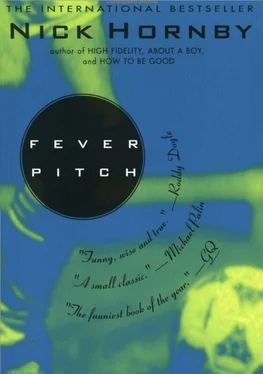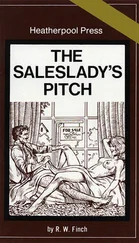What I enjoyed most of all, however, was the way the players revealed themselves, their characters and their flaws, almost immediately. The modern First Division player is for the most part an anonymous young man: he and his colleagues have interchangeable physiques, similar skills, similar pace, similar temperaments. Life in the Fourth Division was different. Cambridge had fat players and thin players, young players and old players, fast players and slow players, players who were on their way out and players who were on their way up. Jim Hall, the centre-forward, looked and moved like a 45-year-old; his striking partner Alan Biley, who later played for Everton and Derby, had an absurd Rod Stewart haircut and a greyhound’s pace; Steve Spriggs, the midfield dynamo, was small and squat, with little stubby legs. (To my horror I was repeatedly mistaken for him during my time in the city. Once a man pointed me out to his young son as I was leaning against a wall, smoking a Rothmans and eating a meat pie, some ten minutes before a game in which Spriggs was appearing—a misapprehension which says much for the expectations the people of Cambridge had for their team; and once, in a men’s toilet in a local pub, I got into an absurd argument with someone who simply refused to accept that I was not who I said I wasn’t.) Most memorable of all was Tom Finney, a sly, bellicose winger who, incredibly, was to go on to the 1982 World Cup finals with Northern Ireland, although he only ever sat on the bench, and whose dives and fouls were often followed by outrageous winks to the crowd.
I used to believe, although I don’t now, that growing and growing up are analogous, that both are inevitable and uncontrollable processes. Now it seems to me that growing up is governed by the will, that one can choose to become an adult, but only at given moments. These moments come along fairly infrequently—during crises in relationships, for example, or when one has been given the chance to start afresh somewhere—and one can ignore them or seize them. At Cambridge I could have reinvented myself if I had been smart enough; I could have shed the little boy whose Arsenal fixation had helped him through a tricky patch in his childhood and early teens, and become somebody else completely, a swaggeringly confident and ambitious young man sure of his route through the world. But I didn’t. For some reason, I hung on to my boyhood self for dear life, and I let him guide me through my undergraduate years; and thus football, not for the first or last time, and through no fault of its own, served both as a backbone and as a retardant.
And that was university, really. No Footlights, no writing for Broadsheet or Stop Press , no Blue, no Presidency of the Union, no student politics, no dining clubs, no scholarships or exhibitions, no nothing. I watched a couple of films a week, I stayed up late and drank beer, I met a lot of nice people whom I still see regularly, I bought and borrowed records by Graham Parker and Television and Patti Smith and Bruce Springsteen and the Clash, I attended one lecture in my entire first year, I played twice a week for the college second or third teams … and I waited for home games at the Abbey or cup-ties at Highbury. I managed, in fact, to ensure that any of the privileges a Cambridge education can confer on its beneficiaries would bypass me completely. In truth I was scared of the place, and football, my childhood comforter, my security blanket, was a way of coping with it all.
ARSENAL v LEICESTER CITY
2.4.77
I did something else in that year, apart from watch football, talk and listen to music: I fell stomach-clenchingly for a smart, pretty and vivacious girl from the teacher-training college. We cleared our desks (she had already attracted the attention of several other suitors in the first few weeks, and I had a girlfriend at home) and spent much of the next three or four years in each other’s company.
She is a part of this story, I think, in several ways. For a start, she was the first girlfriend who ever came to Highbury (in the Easter holidays at the end of our second term). The early-season new-broom promise had long since disappeared; in fact, Arsenal had just beaten the club record for the longest losing streak in their history—they had managed to lose, in consecutive games, to Manchester City, Middlesbrough, West Ham, Everton, Ipswich, West Brom and QPR. She charmed the team, however, much as she had charmed me, and we scored three times in the first quarter of the game. Graham Rix got the first on his début and David O’Leary, who went on to score maybe another half a dozen times in the next decade, got two in the space of ten minutes. Once again Arsenal were thoughtful enough to behave so oddly that the match, and not just the occasion, would be memorable for me.
It was strange having her there. In a misguided notion of gallantry—I’m sure she would rather have stood—I insisted that we bought seats in the Lower West Stand; all I remember now is how she responded each time Arsenal scored. Everyone in the row stood up apart from her (in the seats, standing up to acclaim a goal is an involuntary action, like sneezing); three times I looked down to see her shaking with laughter. “It’s so funny ,” she said by way of explanation, and I could see her point. It had really never occurred to me before that football was, indeed, a funny game, and that like most things which only work if one believes , the back view (and because she remained seated she had a back view, right down a line of mostly misshapen male bottoms) is preposterous, like the rear of a Hollywood film set.
Our relationship—the first serious, long-term, stay-the-night, meet-the-family, what-about-kids-one-day sort of thing for either of us—was in part all about discovering for the first time the mysteries of our counterparts in the opposite sex. I had had girlfriends before, of course; but she and I had similar backgrounds and similar pretensions, similar interests and attitudes. Our differences, which were enormous, arose mostly because of our genders; if I had been born a girl, she was the sort of girl, I realised and hoped, that I would have been. It was probably for this reason that I was so intrigued by her tastes and whims and fancies, and her belongings induced in me a fascination for girls’ rooms that continued for as long as girls had rooms. (Now I am in my thirties they don’t have rooms any more—they have flats or houses, and they are often shared with a man anyway. It is a sad loss.)
Her room helped me to understand that girls were much quirkier than boys, a realisation that stung me. She had a collection of Yevtushenko’s poems (who the hell was Yevtushenko?) and unfathomable obsessions with Anne Boleyn and the Brontës; she liked all the sensitive singer/songwriters, and was familiar with the ideas of Germaine Greer; she knew a little about paintings and classical music, knowledge gleaned from somewhere outside the A-level syllabus. How had that happened? How come I had to rely on a couple of Chandler paperbacks and the first Ramones album to provide me with some kind of identity? Girls’ rooms provided countless clues to their character and background and tastes; boys, by contrast, were as interchangeable and unformed as foetuses, and their rooms, apart from the odd Athena poster here and there (I had a Rod Stewart poster on my wall, which I liked to think was aggressively, authentically and self-consciously down-market) were as blank as the womb.
It is true to say that most of us were defined only by the number and extent of our interests. Some boys had more records than others, and some knew more about football; some were interested in cars, or rugby. We had passions instead of personalities, predictable and uninteresting passions at that, passions which could not reflect and illuminate us in the way that my girlfriend’s did … and this is one of the most inexplicable differences between men and women.
Читать дальше











